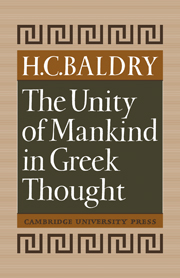Summary
ALEXANDER THE GREAT
Although our theme is the history of an idea, it becomes necessary at this point to turn our attention to a figure who was primarily a man of action: Alexander the Great. Alexander' impact on the Greek conception of mankind has been variously assessed. Estimates of him have ranged from the soldier concerned with practical policies for particular ends, to the dreamer who envisaged a world of universal brotherhood, and so must be regarded as the creator and earliest champion of the idea of human unity. It will be best to consider first how far this latter verdict, which would make Alexander the turning point in our story, can be accepted as valid.
The view that Alexander was philosopher as well as man of action, and held a conscious and explicit belief in the unity of mankind, had its supporters in antiquity as well as in modern times. In our extant Greek hterature the chief exposition of it is a short work, De Alexandri Magni Fortuna aut Virtute, attributed to Plutarch and probably an early product of his pen. The treatise is the first of two speeches composed in reply to the claim that Alexander' achievements were the result of fortune; on the contrary, declares Plutarch, his actions and policies sprang from the inspiration of philosophy; moreover, Alexander was no mere theoriser like other philosophers, but went beyond them all in that he put his ideas into practice.
- Type
- Chapter
- Information
- The Unity of Mankind in Greek Thought , pp. 113 - 140Publisher: Cambridge University PressPrint publication year: 1965

